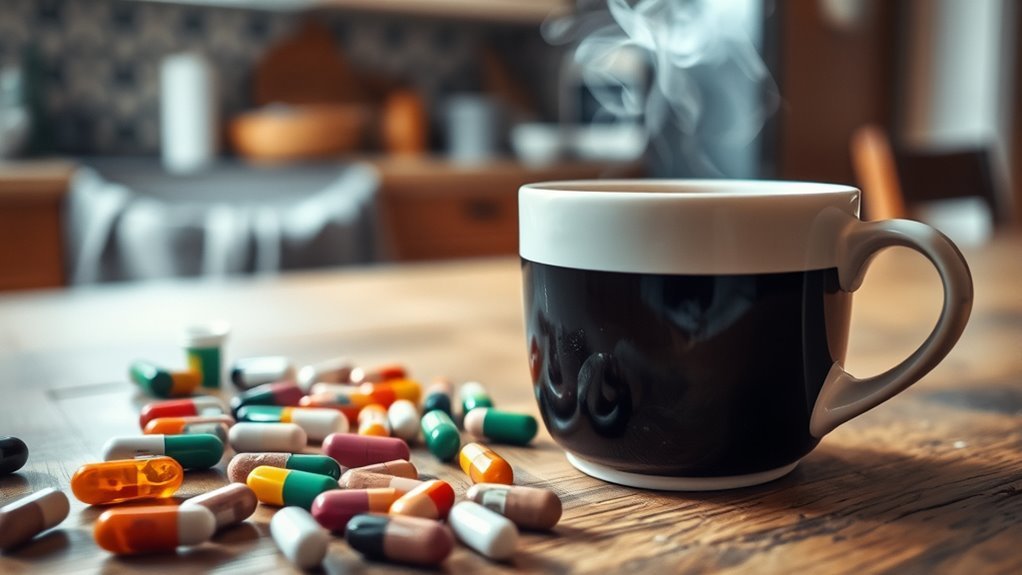The Side Effects of Coffee: What to Watch Out For
When you drink coffee, watch out for increased anxiety, sleep disruptions, and digestive issues like stomach upset or heartburn. Coffee can also raise your heart rate and blood pressure, especially if you’re sensitive or hypertensive. Regular use may lead to dependence, causing withdrawal symptoms if you skip a cup. Additionally, coffee might interfere with certain medications. Understanding these effects helps you enjoy coffee mindfully, and exploring these topics further reveals ways to manage your intake safely.
Increased Anxiety and Nervousness

Although coffee is a popular stimulant that many rely on for a quick energy boost, it can also increase feelings of anxiety and nervousness. If you have caffeine sensitivity, even small amounts of coffee may amplify anxiety triggers, making you feel jittery or restless. This happens because caffeine stimulates your central nervous system, increasing heart rate and stress hormones. However, not everyone experiences these effects equally—your genetic makeup and tolerance play key roles. Understanding your caffeine sensitivity helps you manage intake without sacrificing the freedom to enjoy coffee. If you notice heightened anxiety after drinking coffee, consider reducing consumption or switching to lower-caffeine alternatives. Balancing your desire for energy with awareness of how caffeine affects your body empowers you to make choices that support both mental clarity and emotional calmness.
Sleep Disruptions and Insomnia
You might notice that drinking coffee, especially later in the day, can interfere with your sleep quality by reducing deep sleep stages. The timing of your caffeine intake plays an important role, as consuming it too close to bedtime often leads to difficulty falling asleep or staying asleep. Understanding how caffeine affects your sleep can help you make better choices to avoid insomnia.
Impact on Sleep Quality
Because caffeine is a stimulant, drinking coffee late in the day can interfere with your ability to fall asleep and reduce overall sleep quality. If you’re sensitive to caffeine, even moderate amounts can disrupt your sleep cycles, leading to lighter, less restorative rest. Your sleep environment matters, too—quiet, dark, and cool settings help counteract some caffeine’s effects, but they may not fully overcome its impact. Research shows caffeine blocks adenosine receptors, which promote sleepiness, making it harder to unwind. While some people metabolize caffeine quickly, others experience prolonged effects, so understanding your caffeine sensitivity is key. To protect your sleep freedom, consider how coffee influences your rest and adjust accordingly. Balancing enjoyment with mindful consumption helps you maintain both alertness and quality sleep.
Caffeine Timing Effects
Understanding how caffeine affects your sleep involves more than just recognizing its impact on sleep quality; the timing of your coffee intake plays a significant role in sleep disruptions and insomnia. Because caffeine metabolism variations differ among individuals, what’s best for one person might cause problems for another. To protect your sleep, consider the best caffeine timing based on your body’s processing speed.
| Time of Day | Effect on Sleep | Recommendation |
|---|---|---|
| Morning | Minimal interference | Safe for most people |
| Early afternoon | Mild delay in sleep onset | Limit intake |
| Late afternoon | Increased sleep disruption | Avoid caffeine |
| Evening | High risk of insomnia | No caffeine intake |
Adjust your coffee habits to align with these guidelines for better sleep freedom.
Digestive Problems and Stomach Upset
Although many enjoy coffee for its stimulating effects, it can sometimes lead to digestive problems and stomach upset. Coffee is acidic and may irritate your stomach lining, causing bloating discomfort or even acid reflux. For some, it acts as a laxative, increasing gut motility, which might trigger diarrhea. These effects vary depending on your tolerance and the amount you consume. If you notice consistent bloating or discomfort after your morning cup, it’s worth considering your intake or opting for low-acid coffee varieties. Also, drinking coffee on an empty stomach can exacerbate these issues. Listening to your body’s responses helps you enjoy coffee without the digestive downsides, allowing you the freedom to savor it comfortably and healthily.
Elevated Heart Rate and Blood Pressure
When you drink coffee, the caffeine can temporarily raise your heart rate and blood pressure by stimulating your central nervous system. This elevated heart rate and blood pressure effect varies between individuals, influenced by factors like sensitivity and existing health conditions. While moderate caffeine intake is generally safe, those with hypertension or heart issues should monitor their response carefully.
| Effect | Cause | Consideration |
|---|---|---|
| Elevated Heart Rate | Caffeine stimulation | Can feel like palpitations |
| Increased Blood Pressure | Nervous system activation | Riskier for hypertensive people |
| Duration | 1-3 hours post-consumption | Effects are temporary |
| Individual Variation | Genetic & lifestyle factors | Some tolerate caffeine better |
Understanding these effects helps you make informed choices about your coffee consumption.
Dependence and Withdrawal Symptoms

If you regularly consume coffee, you might notice that skipping your usual cup can lead to withdrawal symptoms such as headaches, irritability, and fatigue. These symptoms occur because your body develops caffeine tolerance, requiring more caffeine to achieve the same effects over time. This can lead to psychological dependence, where you feel like you need coffee to function or concentrate. While caffeine dependence is generally less severe than addiction to other substances, it can still impact your daily freedom if you’re not mindful. The good news is that withdrawal symptoms typically peak within 24-48 hours and lessen within a week as your body readjusts. Being aware of this cycle allows you to manage your intake consciously and avoid feeling trapped by caffeine’s effects.
Bone Health and Calcium Absorption Concerns
Because caffeine can interfere with calcium absorption, you might wonder how your coffee habit affects your bone health. Evidence suggests that excessive coffee intake could contribute to calcium depletion, potentially impacting bone density over time. However, moderate consumption usually poses minimal risk if you maintain a balanced diet. Consider these points:
- High caffeine intake may reduce calcium absorption by up to 5-10%.
- This reduction could slightly lower bone density if calcium intake isn’t sufficient.
- Women, especially postmenopausal, might be more vulnerable to bone loss linked to caffeine.
- Balancing coffee with calcium-rich foods or supplements can help mitigate risks.
Effects on Pregnancy and Fetal Development
Although moderate coffee consumption is generally considered safe, you should be aware that high caffeine intake during pregnancy may affect fetal development. Studies suggest excessive caffeine raises pregnancy risks like low birth weight and preterm birth. Since caffeine crosses the placenta, it can impact your baby’s growth. Balancing your coffee intake supports both your freedom and your baby’s health.
| Caffeine Intake Level | Potential Pregnancy Risks |
|---|---|
| Low (under 200 mg/day) | Minimal risk; generally safe |
| Moderate (200-300 mg/day) | Slight increase in risks |
| High (over 300 mg/day) | Higher risk of fetal growth issues |
| Very High (over 500 mg/day) | Significant pregnancy risks |
Understanding these impacts helps you make informed choices during pregnancy without unnecessary restrictions.
Impact on Acid Reflux and Heartburn

If you suffer from acid reflux or heartburn, you might notice that coffee can trigger or worsen your symptoms by increasing stomach acid production. However, individual responses vary, so monitoring your intake and timing can help manage discomfort. Understanding how coffee affects your digestive system is key to finding a balance that works for you.
Coffee’s Role in Acid
While coffee is a beloved morning ritual for many, it can sometimes trigger or worsen acid reflux and heartburn. This is largely due to coffee acidity, which may disrupt your stomach’s acid balance. Understanding coffee’s role in acid can help you enjoy it without discomfort. Here’s what to take into account:
- Coffee naturally contains acids that can increase stomach acid production.
- High acidity can weaken the lower esophageal sphincter, allowing acid to escape into the esophagus.
- Dark roast coffee tends to be less acidic than light roast, potentially reducing symptoms.
- Individual tolerance varies, so monitoring your reactions is key.
Managing Heartburn Symptoms
Because coffee can trigger or worsen heartburn symptoms, managing your intake and habits is essential to reduce discomfort. Identifying your personal heartburn triggers, including coffee type and consumption timing, is key. Making dietary adjustments like reducing acidic and fatty foods alongside coffee can further ease symptoms. Here’s a simple guide to help you enjoy coffee without aggravating acid reflux:
| Habit | Recommendation | Benefit |
|---|---|---|
| Coffee Type | Choose low-acid varieties | Less irritation to esophagus |
| Brewing Method | Cold brew or espresso | Lower acidity levels |
| Consumption Timing | Avoid on empty stomach | Reduces acid production |
| Portion Size | Limit to 1-2 cups daily | Minimizes reflux episodes |
| Dietary Adjustments | Pair with non-acidic foods | Neutralizes stomach acid |
Balancing your coffee habits lets you savor freedom without sacrifice.
Potential Interactions With Medications

Although coffee is widely enjoyed for its stimulating effects, it can interact with certain medications in ways that may affect their efficacy or increase side effects. Coffee influences both medication absorption and drug metabolism, which means it can alter how your body processes various drugs. Here are some key points to reflect on:
Coffee can alter how your body absorbs and metabolizes medications, impacting their effectiveness and side effects.
- Coffee may reduce the absorption of certain medications, making them less effective.
- It can speed up drug metabolism, causing some drugs to clear faster and potentially lowering their impact.
- Caffeine in coffee can amplify side effects of stimulant medications, increasing nervousness or heart rate.
- It might interfere with sedatives or anti-anxiety drugs, reducing their calming effects.
Always consult your healthcare provider about your coffee intake when you’re on medication to maintain your freedom and well-being.
Frequently Asked Questions
Can Coffee Consumption Affect Dental Health?
Imagine your smile as a bright canvas; coffee can slowly paint it with brownish hues by staining teeth over time. Besides discoloration, the acidity in coffee might contribute to enamel erosion, making teeth more sensitive and vulnerable. However, moderate coffee drinking, paired with good dental hygiene—like brushing and rinsing—helps protect your freedom to enjoy coffee without sacrificing dental health. So, keep sipping wisely and care for your smile!
Does Coffee Have Any Impact on Cholesterol Levels?
You might wonder if coffee and cholesterol are connected. Research shows that unfiltered coffee, like French press, can raise cholesterol due to compounds called cafestol and kahweol. Caffeine itself has minimal impact on lipids. So, if you’re watching cholesterol levels, it’s wise to choose filtered coffee. This way, you can enjoy your cup while keeping your lipid profile in check, balancing your freedom to enjoy coffee with health considerations.
How Does Coffee Influence Hydration and Water Balance?
Did you know that moderate coffee consumption doesn’t greatly dehydrate you? When you drink coffee, it can have a mild diuretic effect, but it doesn’t dramatically lower your hydration levels. In fact, the water in your coffee contributes to your overall fluid intake. However, excessive intake might affect water retention, so balancing coffee with plain water helps maintain ideal hydration. Enjoy your coffee freely but stay mindful of your body’s signals.
Are There Benefits of Coffee for Cognitive Function?
You’ll find that coffee can offer memory enhancement by boosting alertness and concentration, which helps you process information more efficiently. Studies also suggest regular coffee consumption might lower the risk of cognitive decline as you age. However, it’s not a magic bullet—you’ll need a balanced lifestyle for lasting benefits. So, while coffee can support your cognitive function, it’s best enjoyed in moderation to maximize its positive effects.
Can Coffee Cause Allergic Reactions in Some People?
Imagine your morning cup of coffee turning from a comforting hug into a sneaky adversary. Yes, coffee allergies are real but rare; some people might experience itching, hives, or even digestive issues. More common is caffeine sensitivity, where even small amounts can cause jitters or rapid heartbeat. Knowing your body’s limits helps you enjoy coffee freely without unexpected reactions. If symptoms arise, consider consulting a healthcare professional to find your balance.






